- Home
- Burt L. Standish
Wild Adventures in Wild Places Page 8
Wild Adventures in Wild Places Read online
Page 8
began to bank up in the sky, and that very day theice broke up, steam was got up, and, more quickly than before, the_Grampus_ headed homewards.
There was an air of greater gravity about the captain, as he came belowto dinner that day, than ever Frank and his friends had seen.
"I hope there is nothing serious the matter, captain?" Chisholminquired.
"Not as yet, gentlemen," replied the captain, with an uneasy kind of asmile, "but the glass is going tumbling down, and the ice grows heavierand more dangerous the nearer to the open sea we get. I fear we'regoing to have a blow."
He soon after went on deck, whither our heroes followed him. The floeswere of great size, heavy, mischievous-looking pieces, covered with snowon the top, but with a deal of hard green stuff under water. Againstthese the ship was constantly bumping, with a violence that made everyone on deck stagger and reel. The captain himself was on the bridgegiving constant orders, for the ship was being steered by the ice; theobject being to strike the pieces stem on, and so save the morevulnerable bows or quarters.
The day wore gloomily away, and the night closed in dark and stormy. Noone cared to lie down or seek for rest; there was a cloud on the heartof every one on board--a strange foreboding of evil to come. The windsoon increased to all the fury of a gale; the waves dashed over the shipwith such violence that when struck you couldn't have told whether itwas with a piece of ice or a green sea.
It was just two bells in the morning watch, and the night was at itsdarkest, when the good ship was caught with tremendous force between twomighty floes, which, as soon as they had done the mischief, began topart and leave the sinking ship to her sad fate. The next moment theengineer had rushed on deck to say the engines had stopped. All was nowconfusion on board, for there was a strange steadiness about the vesselthat told she was sinking fast.
Boats were of no use in that terrible tempest-tossed ocean, so orderswere given to get ready the ice-anchors. By dint of courage andstrength, the anchors were thrown, and the ship made fast for a time, tothe nearest berg. It was but for a time, alas! And now commenced allthe hurry and horror of this pitiful disembarkation. The waves washedover both ship and berg, making the former quiver all over like somecreature in the throes of death, and causing the berg itself to heelover like a great raft.
Morning broke grey and cold and dismal; but hours before, the _Grampus_had slipped her ice-anchors, and gone down head foremost; and, out ofall her crew of fifty men, fifteen only were alive to see the sunrise,and thank the God who had spared their lives--fifteen, and the ship'sdog. Our heroes were saved, or this story would not be written; but,with the exception of Captain Anderson, every other officer met with awatery grave.
I have not the heart to harrow the feelings of my youthful readers witha relation of the horrors the survivors of the foundered ship had toendure on that floating iceberg. For a whole week they were tossedabout among the stormy waves of that cold ocean, drifting before aneastern gale that blew with almost the force of a hurricane. But iftheir half-frozen hearts were still capable of feeling one atom of joy,they must surely have beat faster when the captain, glass in hand, buthalf buried in spray, shouted--"Land, land! I see it, I see it!"
Ah! there were hearts on that berg that would never beat again, for atthat moment six of the original fifteen lay dead on the berg.
The storm now abated, and the sea went down; but yet another danger hadto be encountered, for strange black monsters, with fierce eyes, rose upfrom the depth of ocean and sought to scale the berg. Was it after thedead they had come?
Boats at last!--only the boats of native Indians, but they came withfriendly intentions.
So they committed the bodies of their late comrades to the deep, and,embarking with the Indians, were rowed on shore to a new land. Frankwas in a sad way: he was carried to the hut of a chief; medicine menwere sent for to look upon him and administer to him herbs strangelycompounded, and wise old squaws uttered their spells over his prostrateform; but it was the nursing he received, after all, from Chisholm andFred that at last brought him round.
Their fare while they lived among the Indians was very poor of its kind;but then, a gift-horse should not be looked in the mouth. These poorpeople gave them a portion of all they possessed, and they gave it, too,with right good will. Captain Anderson could speak their language--akind of Yack _patois_--and held many long conversations with the chief--a great man in the estimation of the tribe, and in reality a true man,although only a savage. Anderson held him spell-bound, as he told ofsome of the strange cities and countries there were in the world. Heliked to hear the captain talk, and still, from the sinister look andincredulous smile on his face as he listened, you could see that hethought the narrator was drawing largely on his imagination.
It was very kind of this chief to invite the captain, our heroes, andthe survivors of the melancholy shipwreck to stay with him for the restof their lives.
"Blubber," he said, "would never fail them; salt fish and seal's fleshcould always be had in abundance, with now and then a bit of a whale asa treat. Then they could take them wives from the daughters of hispeople, and the smoke from their wigwams would ascend for ever."
It was a pretty picture, Anderson allowed; but--there is no accountingfor taste; he loved his own home in England better.
"Then in that case," said Kit Chak--and here spoke the noble savage--"Iand my brother will guide you through the great forest to Inchboon,where lies a Danish whaler. The journey will take us one moon."
One moon!--nearly thirty days. It was a fearful undertaking; but whatwill not men do for home and country? So all preparations were made forthe march, and in three days they were ready to start.
"You do well to wrap up, Frank, my boy," said Chisholm to his youngfriend; "but, beside the captain, you _do_ look odd."
In twenty-five days, after sufferings and hardships that they neverforgot, they arrived at Inchboon, and sure enough they found the Danishship. She was bound to Russia, though; if that would suit them, saidthe captain, his vessel was at their service.
They gladly accepted his offer, bade brave Kit Chak and his brotheradieu (not without well rewarding them), and in six weeks' time theywere landed at Cronstadt.
Our travellers now were as happy as kings; but where, they wondered,would they turn up next?
CHAPTER SEVEN.
PART III--THE RUSSIAN STEPPES.
QUIET DAYS ON THE KYRA--CAPTAIN VARDE'S HAPPY HOME--FRED FREEMAN'SRUSTIC RUSSIAN--THE CAPTAIN TELLS A TALE OF ADVENTURE.
The captain of the Danish barque, who had brought our three heroessafely into Russian waters, was one of those individuals who are neverso happy as when ministering to the comfort and pleasure of others.
"Having landed you in Europe," he said, on the very last day they dinedtogether on board, "I dare say I ought to let you go, but I assure you,gentlemen, I am not tired of you, and if you will accept of a few weeksof the kind of rude hospitality I can offer you, at my little countryhome on the banks of the Kyra, I shall be delighted."
"Stop," he continued, smilingly, holding up his hand as Chisholm wasabout to speak, "I know everything you would say, so there is nooccasion to say anything. I have been kind to you, and you feel so muchindebted to me already, that you are unwilling to trespass further on mygoodness. That is what you would say; but, dear gentlemen, if you dofeel under an obligation to me, you can amply repay me, and even confera favour on me, by giving me a few weeks of your company."
"What say you, Fred?" asked Chisholm.
"Oh!" Fred replied, "I am delighted at finding such a pleasant `new wayof paying old debts.' Let us go by all means."
"As for me, my friends," said Captain Anderson, "I must leave youto-morrow. Although the loss of my ship was no fault of mine, it was aterrible misfortune, and one which it will be long ere I can forget, andlonger still ere it will be forgotten against me."
"We need not tell you," said Chisholm, "how truly sorry we are to partwith you. We will live in the hope
s of meeting you some day in England,and renewing our acquaintance with one in whose ship we sailed so longand spent so many happy hours."
So next day the captain of the lost brig _Grampus_ and our friendsparted. They stayed just one week in Cronstadt, communicating bytelegraph with those at home, then, in company with their new friend,started for his cottage on the Kyra. They were not sorry when, threedays after leaving Saint Petersburg, they found themselves down in thevery heart of the cool green country, and in a spot which, but for thedifferent dress and language of the people they met, they could easilyhave fancied was a part of England itself. If they were delighted withthe country, they were not less so with the house and home itself ofCaptain Varde, their kindly host. Half buried in trees, it wasapproached by a broad and beautiful avenue, which led through well-keptlawns to what you would have been bound to

 Dick Merriwell Abroad; Or, The Ban of the Terrible Ten
Dick Merriwell Abroad; Or, The Ban of the Terrible Ten Wild Adventures round the Pole
Wild Adventures round the Pole Storm-Bound; or, A Vacation Among the Snow Drifts
Storm-Bound; or, A Vacation Among the Snow Drifts In the Yellow Sea
In the Yellow Sea Frank Merriwell's Triumph; Or, The Disappearance of Felicia
Frank Merriwell's Triumph; Or, The Disappearance of Felicia Treasure of Kings
Treasure of Kings Bert Wilson's Twin Cylinder Racer
Bert Wilson's Twin Cylinder Racer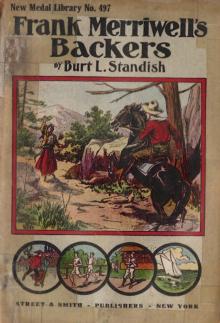 Frank Merriwell's Backers; Or, The Pride of His Friends
Frank Merriwell's Backers; Or, The Pride of His Friends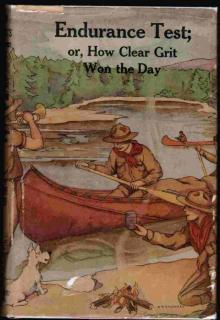 Endurance Test; or, How Clear Grit Won the Day
Endurance Test; or, How Clear Grit Won the Day Great Hike; or, The Pride of the Khaki Troop
Great Hike; or, The Pride of the Khaki Troop The Swan and Her Crew
The Swan and Her Crew A cup of sweets, that can never cloy: or, delightful tales for good children
A cup of sweets, that can never cloy: or, delightful tales for good children Frank Merriwell's Bravery
Frank Merriwell's Bravery Frank Merriwell Down South
Frank Merriwell Down South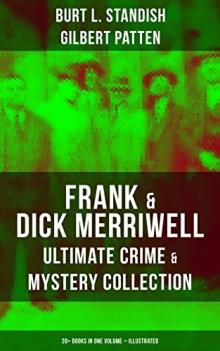 Dick Merriwell's Trap; Or, The Chap Who Bungled
Dick Merriwell's Trap; Or, The Chap Who Bungled The Trail of the Seneca
The Trail of the Seneca Wild Life in the Land of the Giants: A Tale of Two Brothers
Wild Life in the Land of the Giants: A Tale of Two Brothers From Squire to Squatter: A Tale of the Old Land and the New
From Squire to Squatter: A Tale of the Old Land and the New The Cruise of the Snowbird: A Story of Arctic Adventure
The Cruise of the Snowbird: A Story of Arctic Adventure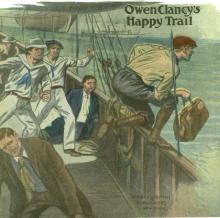 Owen Clancy's Happy Trail; Or, The Motor Wizard in California
Owen Clancy's Happy Trail; Or, The Motor Wizard in California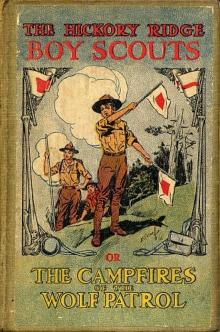 Boy Scouts: Tenderfoot Squad; or, Camping at Raccoon Lodge
Boy Scouts: Tenderfoot Squad; or, Camping at Raccoon Lodge Sing a Song of Sixpence
Sing a Song of Sixpence Frank Merriwell's New Comedian; Or, The Rise of a Star
Frank Merriwell's New Comedian; Or, The Rise of a Star The Sa'-Zada Tales
The Sa'-Zada Tales The Girl Scout's Triumph; or, Rosanna's Sacrifice
The Girl Scout's Triumph; or, Rosanna's Sacrifice Wild Adventures in Wild Places
Wild Adventures in Wild Places Fairies I Have Met
Fairies I Have Met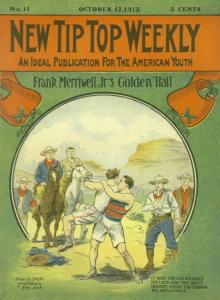 Frank Merriwell's Son; Or, A Chip Off the Old Block
Frank Merriwell's Son; Or, A Chip Off the Old Block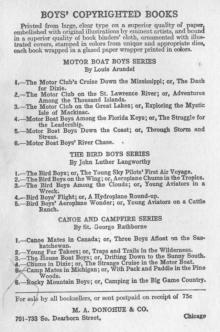 Motor Boat Boys' River Chase; or, Six Chums Afloat and Ashore
Motor Boat Boys' River Chase; or, Six Chums Afloat and Ashore Frank Merriwell's Athletes; Or, The Boys Who Won
Frank Merriwell's Athletes; Or, The Boys Who Won Bart Keene's Hunting Days; or, The Darewell Chums in a Winter Camp
Bart Keene's Hunting Days; or, The Darewell Chums in a Winter Camp Captain June
Captain June